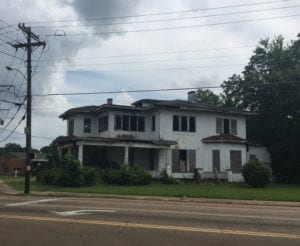There is talk of decline in West Jackson. Depending on who you ask about this, though, you’ll either have people who whole heartedly agree, or those who would push back on what a discourse of decline and what that language betrays. Sharon (names changed) is a local landlord. Her mother bought a small apartment complex in West Jackson in the early 90s. Sharon tells me that it was “terrible” then. There was a brief period of rejuvination, and now things have started on a downturn again. When I ask when this downturn began she tells me, with surpising specificity, “twelve years ago”. I bring this conversation up with a Tougaloo professor who quickly points out how narratives of neighborhoods getting “worse” is often just coded language for “blacker”. West Jackson underwent a key demographic shift in the 1980s as black people started moving into the area. They very quickly became the majority as their white neighbors fled to the suburbs with violent rapidity, leaving in their wake a huge amount of abandoned, now dilapidated, property.

From statisticatlas.com
As was pointed out to me recently, it’s ironic how threatening black people are painted to be when “we haven’t even destroyed anything!”. Looking back on the history of West Jackson, it’s interesting that pretty plantation estates are so missed. The illusion of stability that aesthetics lend to certain neighborhoods has a vivid continution in the present. When visiting Eastover, an affluent Jackson neighborhood, I was shocked by the opulence of these brick mansions with white pillars, complete with a flame in a lantern overhanging the front door. The person who was kind enough to take me to this neighborhood was once a part of it himself, and could name the occupation of the owners of each home. This particular mansion, he tells me, belongs to the man who owns a large chicken processing plant–“If you’re eating chicken in this region it’s coming from there”. Another home is owned by the head of a chemicals producing plant, another, by an engineer involved with a damming project. Titans of industry that could probably all be linked to massive pollution. This is all to say that local instabilities don’t hold a candle to the disruptions caused by those who in live in Eastover, even if the neighborhood is billed as safe and clean. Somehow, it is the black population in West Jackson that is so despicable as to prompt the #TakeBackJackson hashtag. It’s obvious from whom the city has to be reclaimed.

It is commonly known that this period of decline is no mistake, is no natural result, but planned. One woman tells me that when she was participating in neighborhood association meetings, she found out that there were business associations that were putting together a twenty year plan for Jackson’s redevelopment, a plan which focuses acutely on gentrifying West Jackson, a neighborhood that lies a stone’s throw from downtown. She heard of this plan, ten, twelve years ago. Though the values of the people in this neighborhood vary, a trait shared by all is a vigilant suspicion that looks to root out conspiracies that abound all around them. A recent community meeting convened to discuss a resource center for the homeless in the old Atmos building in the neighborhood. At first, people were angry that the government was yet again placing an undesirable community asset in their neighborhood, but when a center representative told the audience that they were working with private donors, the suspicions shifted. Some developer, someone told me, must be trying to get access to a government owned building near downtown using this center. Somebody else tells me that the building is full of Asbestos, and with that in mind just getting the building ready will cost 5 million dollars. The fate of the Atmos building is just one example of the gentrification “front” that seems to have been in the works for years.
[youtube https://www.youtube.com/watch?v=wom9KbbCvDs]

I’m glad to read that you are venturing out to different parts of Jackson and attending community meetings (and talking to people!) to get a fuller story of why Cooperation Jackson is such a revolutionary venture specifically for that city. As I think I mentioned, Saki spoke (via Skype) at the Planners Network Conference I attended this past weekend and everyone was really inspired by the projects underway at CJ. Most people who attended that conference, though, were progressive planners from New York with a somewhat abstract excitement about the experiments in Jackson. I think we all want to see the projects succeed there so they can be transplanted elsewhere. But what you are finding, I think, is just how rooted this planning is in *Jackson*. It’s essential for that city’s history, that city’s population, and that city’s survival. I don’t say this to suggest the experiments are not replicable, but rather that they are being done in Jackson because of the specificity of the Black experience there. I want to hear a bit more about the Atmos building. Was it burned down intentionally? Was the idea to burn it down to develop it? Was it landmarked?